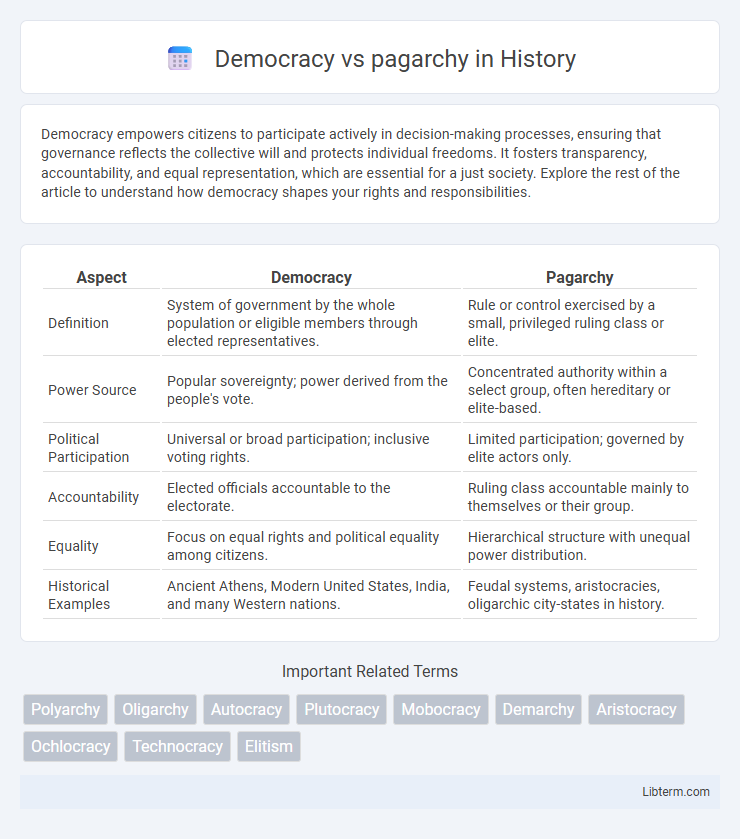Democracy empowers citizens to participate actively in decision-making processes, ensuring that governance reflects the collective will and protects individual freedoms. It fosters transparency, accountability, and equal representation, which are essential for a just society. Explore the rest of the article to understand how democracy shapes your rights and responsibilities.
Table of Comparison
| Aspect | Democracy | Pagarchy |
|---|---|---|
| Definition | System of government by the whole population or eligible members through elected representatives. | Rule or control exercised by a small, privileged ruling class or elite. |
| Power Source | Popular sovereignty; power derived from the people's vote. | Concentrated authority within a select group, often hereditary or elite-based. |
| Political Participation | Universal or broad participation; inclusive voting rights. | Limited participation; governed by elite actors only. |
| Accountability | Elected officials accountable to the electorate. | Ruling class accountable mainly to themselves or their group. |
| Equality | Focus on equal rights and political equality among citizens. | Hierarchical structure with unequal power distribution. |
| Historical Examples | Ancient Athens, Modern United States, India, and many Western nations. | Feudal systems, aristocracies, oligarchic city-states in history. |
Understanding Democracy: Principles and Foundations
Democracy is founded on principles of popular sovereignty, political equality, and individual freedoms, enabling citizens to participate directly or through elected representatives in decision-making processes. This system contrasts sharply with pagarchy, where power is concentrated in the hands of a few elites or military rulers who exercise authority without broad-based consent. Understanding democracy involves recognizing its emphasis on rule of law, accountability, and protection of human rights as essential foundations for legitimate governance.
What is Pagarchy? Origins and Core Concepts
Pagarchy, derived from Greek roots meaning "rule of a village" or "local governance," refers to a decentralized political system where power is maintained by local groups or leaders rather than a centralized authority. Originating in ancient community structures, pagarchy emphasizes decision-making through local councils or assemblies that hold autonomy over their affairs, prioritizing grassroots participation and consensus-building. Unlike democracy's focus on broad citizen voting and representation, pagarchy centers on governance by smaller, often kinship-based units, highlighting localized control and social cohesion within defined communities.
Historical Evolution: Democracy and Pagarchy in Practice
Democracy evolved from ancient Athens' direct citizen participation to modern representative systems characterized by universal suffrage and rule of law, emphasizing citizen rights and governmental accountability. Pagarchy, a less-known governance model rooted in decentralized, hierarchical structures, historically functioned through localized authority and ritualistic legitimacy, often seen in tribal or clan-based societies. The historical evolution of democracy reflects increasing institutional complexity and legal frameworks, whereas pagarchy persists in traditional contexts, highlighting diverse approaches to social order and political organization.
Key Differences Between Democracy and Pagarchy
Democracy prioritizes equal participation and representation of citizens in decision-making processes through free and fair elections, ensuring majority rule and protection of individual rights. Pagarchy, on the other hand, centralizes power within a select group of influential individuals or elites, limiting broader public involvement in governance. The key differences lie in the distribution of political authority, transparency, and the inclusivity of citizen engagement in policy formulation.
Decision-Making Processes: Collective vs. Select Few
Democracy emphasizes inclusive decision-making where authority rests with the collective populace, enabling widespread participation through voting and public discourse. Pagarchy centralizes decision-making power within a select few individuals or elites, limiting participation to an exclusive group that exercises control over governance and policy. This contrast highlights democracy's commitment to egalitarian participation versus pagarchy's reliance on concentrated authority for efficiency and order.
Representation and Governance Structures
Democracy features elected representatives who embody the will of the people, ensuring accountability and participatory governance through transparent electoral processes. In contrast, pagarchy centralizes power within a dominant group or leader, limiting representation to a specific elite and often bypassing broader public input. Governance structures in democracy emphasize checks and balances, while pagarchy relies on hierarchical authority with minimal institutional constraints.
Strengths and Challenges of Democracy
Democracy excels in promoting political participation, ensuring accountability through free elections, and protecting individual rights, which fosters social stability and inclusive governance. However, it faces challenges such as potential inefficiencies in decision-making, vulnerability to populism, and difficulties in achieving consensus in deeply divided societies. The strength of democracy lies in its adaptability and responsiveness to citizens' needs, while its challenges require continuous efforts to maintain transparency and prevent the erosion of democratic norms.
Advantages and Limitations of Pagarchy
Pagarchy offers advantages such as streamlined governance through decentralized authority, promoting faster decision-making and localized accountability compared to traditional democracy. It enables specialized rule by experts, reducing bureaucratic delays and enhancing efficiency in specific policy areas. However, pagarchy faces limitations including potential power concentration among elites, reduced public participation, and challenges in ensuring transparency and equal representation across different sectors of society.
Societal Impact: Democracy vs. Pagarchy
Democracy fosters societal inclusion by enabling broad citizen participation in decision-making, which promotes equality, accountability, and social cohesion. Pagarchy, characterized by hierarchical governance concentrated in small, elite groups, often limits public input and reduces transparency, leading to social stratification and potential disenfranchisement. The contrasting societal impacts highlight democracy's role in empowering communities versus pagarchy's tendency to concentrate power and restrict societal influence.
Future Perspectives: The Relevance of Democracy and Pagarchy
Democracy remains a cornerstone of future governance models, emphasizing citizen participation, transparency, and accountability, crucial for addressing complex global challenges. Pagarchy, characterized by rule from specific knowledge elites, offers a complementary approach by prioritizing expertise and data-driven decision-making in specialized domains such as technology and public health. The evolving political landscape suggests hybrid frameworks blending democratic inclusion with pagarchic efficiency could optimize governance outcomes in increasingly complex societies.
Democracy Infographic

 libterm.com
libterm.com